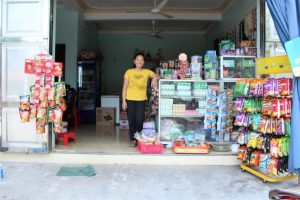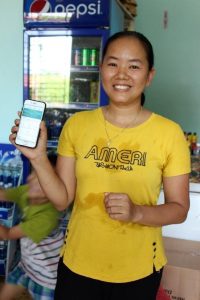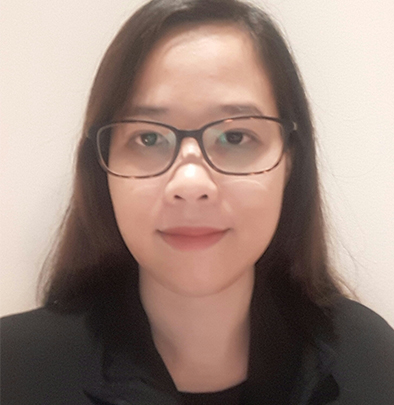Enabling the community to overcome the pandemic through digital payments
by Truong Quyen and Akshat Pathak
Dec 1, 2020
5 min
During the pandemic, Duong Thi Thuy, a mobile money agent in the Quang Ninh province, improvised her business to help her community follow the guidelines on social distancing and government norms. This is her story about the adoption of DFS and how it changed her life.
“We are at the beginning of a change. The pandemic has jolted us out of what was familiar till now and made us value safety, hygiene, and convenience in our daily lives. More people are now willing to try out digital payments than before. I am simply helping my community to embrace this change,” says Duong Thi Thuy, a mobile money agent in the Quang Ninh province.
Thuy runs a small grocery shop with her mother in Quang Ninh, a coastal province in north-eastern Vietnam. Once she completed high school, Thuy wanted to pursue language studies at the local university. However, in light of her mother’s poor health, Thuy took charge of the shop. The mother-daughter duo manages one of the oldest shops in the community. They serve nearly 100 customers of all ages and backgrounds each day.

Thuy considers herself “tech-savvy” and likes to try out new technology. After learning about mobile money services from a friend, she quickly signed up as an agent for a leading local mobile money operator in March, 2019.
Mapping Thuy’s journey as a mobile money agent
When asked about her journey as a mobile money agent, Thuy revealed that she did not receive any formal training on mobile money and her role as an agent. She says, “The sales staff from the mobile money operator only provided basic instructions on how to use the agent app. I learned how to navigate the app mostly by myself. Initially, it was difficult for me, and I made some mistakes.”
Before Thuy started as a mobile money agent, her community was not aware of mobile money services. The new signage about the mobile money service at her shop piqued the curiosity of some regular customers, especially the younger ones. Thuy encouraged her customers to download and try out the mobile money app. She notes, “Most of my customers were apprehensive about the app as they did not know how to use it. Initially, I had to help a customer every time they wanted to conduct a transaction. Many times, I was busy with regular work in the shop, and a customer had to wait for my help to carry out a simple mobile money transaction.”
Thuy adds, “I help customers conduct cash-in and cash-out transactions. I have a daily customer footfall of around 20 to 50. Some of the services I offer include cash-in, cash-out, and bill payments. I earn about VND 3,000-5,000 (USD 0.13-0.22) per bill payment. Most customers come to me for postpaid telecom payments or payments of utility (water or electricity) bills.”
Unfolding the impact of the pandemic
The onset of the COVID-19 pandemic saw restricted mobility due to lockdowns since Tết, the Vietnamese New Year. People were instructed to stay at home unless they had to buy food and medicine. Businesses were closed, public transport was suspended, and the government prohibited public gatherings. This had a debilitating impact on the businesses of micro-merchants like Thuy due to a drop in demand as well as revenues. The pandemic forced 50% of such women-led enterprises to temporarily suspend operations or completely stop or reduce business operations.

With the growing concern over cash as a potential vector of COVID-19, people in her community started to appreciate the safety and convenience of digital payments.
Thuy says, “Local shops provide more than just goods. These shops and markets are vibrant community hubs as many families have shopped here for generations. Over the last three months, I have helped many people in my community try out the mobile money app. The pandemic has boosted their confidence in trying out new methods of payments.”
New users value and demand human interaction, given a lack of trust and confidence in technology-based, self-initiated transactions. Agents like Thuy offer a conduit to electronic payments and transfers to build consumers’ trust in digital financial services. “These days, some of my customers have started to transact on their own. Some of them still need support to load money in their wallets, especially during a promotional period. However, most of my customers prefer over-the-counter service,” says Thuy.
Key takeaways
Thuy believes mobile money is a promising avenue for communities like hers. She feels it can make transactions quicker, cheaper, and safer, especially during unprecedented times like the current pandemic. However, mobile money operators need to make a dedicated effort to support agents like Thuy.
“With time, more people will get familiar with mobile money services and conduct transactions on their own. However, mobile money operators need to invest more in training and provide better support to their agents. They also need to think along the lines of educating customers while making the app easier to navigate and use,” says Thuy.
While agent networks continue to grow in Vietnam, they are nowhere near the density of some of the matured markets, such as Bangladesh. Developing a broader and better-equipped agent network is critical to reach and onboard more customers onto digital financial service platforms. As Thuy’s story demonstrates, providers can handhold their agents to deepen the usage of DFS. Such interventions will help them reach a critical mass of DFS users, initially through assistance and eventually to the desired state where most of them can conduct self-initiated transactions.
MicroSave Consulting (MSC), with support from MetLife Foundation, has been implementing the i3 Program in Bangladesh and Vietnam since 2018. The i3 Program, which stands for “Innovate, Implement and Impact,” works to utilize digital technology and uncover deep insights into the needs, aspirations, and behaviors of low and moderate-income (LMI) people to build and deliver financial services for the mass market. MSC has been working with frontrunners in financial services, from banks to FinTechs and wallet providers to governments, to help LMI segments move toward better financial health by supporting mobile money agents like Thuy through demand- and supply-side interventions. We look forward to continued dialogue, learning, and supporting financial inclusion in Vietnam. Stay tuned for more updates on www.i3program.org.
Written by

Truong Quyen
Manager
 by
by  Dec 1, 2020
Dec 1, 2020 5 min
5 min
Leave comments